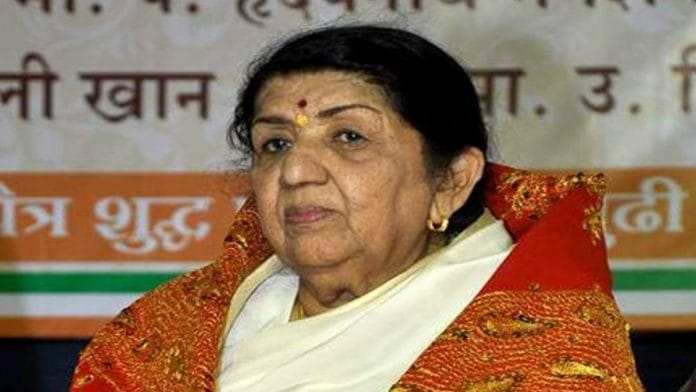New Delhi: ‘Meri awaaz hi pehchaan hai’ — Lata Mangeshkar did not just sing these lines for the film Kinara, she lived them too. A voice that could move millions to tears, including statesmen like Jawaharlal Nehru, is no more.
When she sang, ‘Aye mere watan ke logon’, every Indian remembered the bravery of the soldiers who laid down their lives for the country, when she sang ‘Pyaar kiya toh darna kya’, people believed in Anarkali’s fearless love, while ‘Luka Chuppi’ made them shed tears for their mothers. A voice dipped in honey, yet charged with emotion, Lata Mangeshkar was a legend. Lyricist and poet Javed Akhtar had once said, “When you are talking about Michelangelo, Beethoven or Shakespeare, the name says it all. Lata Mangeshkar’s greatness is her name itself. There is no other word that can encapsulate her.”
The 92-year-old singer, who was hospitalised on 11 January, passed away at Mumbai’s Breach Candy Hospital at around 8 am Sunday due to multi organ failure. She had tested positive for Covid-19 and was undergoing treatment. She was put on ventilator after her condition worsened.
Also Read: ‘Abide With Me’ dropped from Beating Retreat ceremony, ‘Aye Mere Watan Ke Logon’ to replace it
A ‘perfectionist’
Born in Indore in 1929, Mangeshkar began singing and acting at the mere age of five in her father Deenanath Mangeshkar’s plays. When she was 13, she lost her father, the guiding light in her life, to heart disease. Being the eldest child, the family’s responsibility fell on her shoulders. She recorded her first song in 1942 for a Marathi film, ‘Kiti Hasaal’. Her first Hindi song was ‘Aayega aanewala’ for the film Mahal (1949).
After that, she never looked back. She went on to build an immensely successful career of more than 50,000 songs spanning seven decades, and hold the Guinness world record for being the most recorded artist in history. In 2001, she received the Bharat Ratna, India’s highest civilian honour. Actresses wanted her to sing their songs because her voice alone could emote thousands of unspoken feelings. “No matter how much one praises Lata ji, it isn’t enough. She is a perfectionist. She takes her work very seriously. Many other singers have come and gone, but she is unmatched. It is an absolute fact that her singing helped us actresses a lot,” Waheeda Rehman had once said during an interview.
“When you heard a song, without seeing the film in which it appeared, you could tell if Lataji was singing for Meena Kumari, Nargis, Madhubala or Nutan. When she sang for Dimple in Bobby, her voice has the innocence of a 15-year-old,” she added. Her song ‘Aaj phir jeene ki tamanna hai’ sung by Mangeshkar for the film Guide (1965) is still considered one of the most iconic Hindi songs celebrating free-spirited women.
Even though people believed that Lata Mangeshkar’s younger sister Asha Bhosle was more versatile, there are many songs to Lata’s credit that prove she too could go well beyond her comfort zone — be it the notorious touch in ‘Kaanta laga’, nailing the cabaret genre in ‘Aa jane jaan’, or lending her voice to younger actresses like Kajol and Madhuri Dixit when she was in her sixties.
Her dedication to music and her craft is reflected in the fact that she has sung songs in over 30 languages. When Dilip Kumar once made a comment on her Maharashtrian accent while singing Hindi and Urdu songs, she started taking Urdu lessons to work on her pronunciation.
Rang de Basanti director Rakeysh Omprakash Mehra once shared a story about the iconic song ‘Luka Chuppi’: “Every day, she would come to the studio and start rehearsing the song. I would like this to sink in that Lata Mangeshkar would come to the studio every day and rehearse the song. For four days, she rehearsed.”
The legendary singer always said that it was the blessings of her elders that had made her who she was. “That long journey is with me and that little girl is still with me. She has not gone anywhere. Some people call me ‘Saraswati’ or say that I have her blessings. All this is nothing I believe but the blessings of my parents, our deity Mangesh, Sai Baba and god…Otherwise who am I? There have been better singers than me. I am grateful to god, and to my parents for whatever I have today,” she had said in an interview.
Also Read: O.P. Nayyar, the untrained musical genius who was more than just a hit machine






